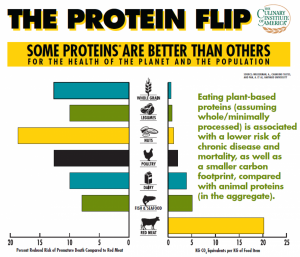![]()
University of Harvard
Sustainable & Healthful Food Standards: “Reduce impact on climate change by increasing proportion of foods that have a smaller emissions footprint and are less resource-intensive.”
Harvard University’s Sustainable Meeting & Event Guide
Harvard Case Study 2015 – ‘Menus of Change’: https://green.harvard.edu/tools-resources/case-study/increasing-sustainable-vegetarian-food-hbs-campus

Harvard T.H. Chan School of Public Health: 5 Tips for Sustainable Eating andThe Nutrition Source – Sustainability
(An earlier iteration of DefaultVeg was initiated at Harvard University in 2015 by partner Forward Food, “with an in-person, hands-on culinary training at Harvard University. Since then, we’ve trained over 11,400 food service professionals.” )
Stanford University
Eat Well @ Stanford: “Residential &Dining Enterprises – Stanford Dining offers a variety of plant-forward options in every dining hall, every day. All vegetarian and vegan options are clearly labeled (V = Vegetarian, VGN = Vegan). Our menus are typically about 80% vegetarian and over 50% vegan, offering a wide range of healthful plant-based options including soy, beans, lentils, whole grains, nuts and seeds. R&DE Stanford Dining has been awarded an A+ rating for vegan dining by Peta(2). We have a Vegan and Plant Forward Sous Chef who specialize in developing new plant-forward recipes and enhancing the vegan dining experience for Stanford University Students. Read our Guide to Vegan & Vegetarian Dining.
University of Michigan
University of Michigan: Offers Low-Carbon menu and Sustainable Mondays – “Eating more plant- based food is a great way to reduce your carbon footprint and you can find many delicious plant-based dishes throughout our dining halls and retail locations. Carbon Neutrality is a campus sustainability goal and Michigan Dining has worked with various constituents around campus to identify the carbon value of our menu items, increase plant-based foods and plant-based proteins into our menu.” “This shift has a huge impact on our carbon footprint, and we’ve seen the carbon footprint of our menus drop by as much as 60% on Mondays compared to other days of the week.” [Food services achieved 60% vegetarian options, with 40% fully plant-based.]
Read more on the Commission on Carbon Neutrality – under Scope 3 emissions, “indirectly attributed to the University and include commuting to campus and food procurement on campus … maintains the targets of achieving carbon neutrality … by no later than 2040.”
Arizona State University
Achieved 30% plant-based options, over 7 dining halls.
See also:
- Berkeley, California: “How A Small City in California Is Going Plant-Based” (Nilang Gor, Sentient Media, April 5, 2021). “On March 9, 2021, Berkeley, California, became the first city in the United States to adopt Vision 2025 for Sustainable Food Policies, a progressive new food purchasing program that addresses the harms that industrial food production has on the environment, social equality, community health, and animal rights. By signing on to the new policy, Berkeley has committed to replacing 50 percent of the city’s animal-based food purchasing with plant-based alternatives.”
